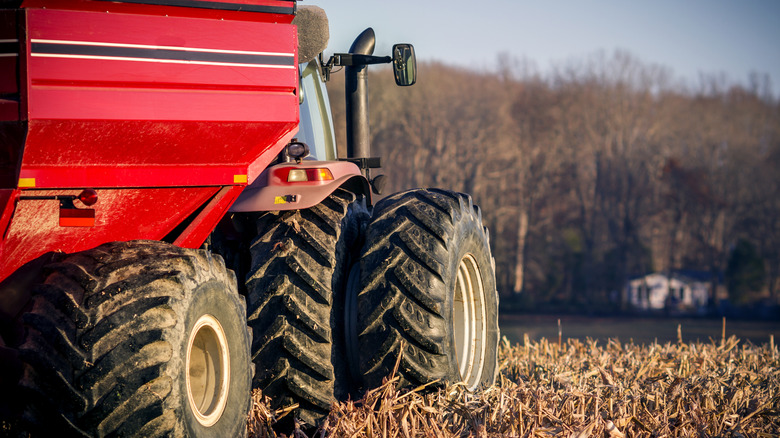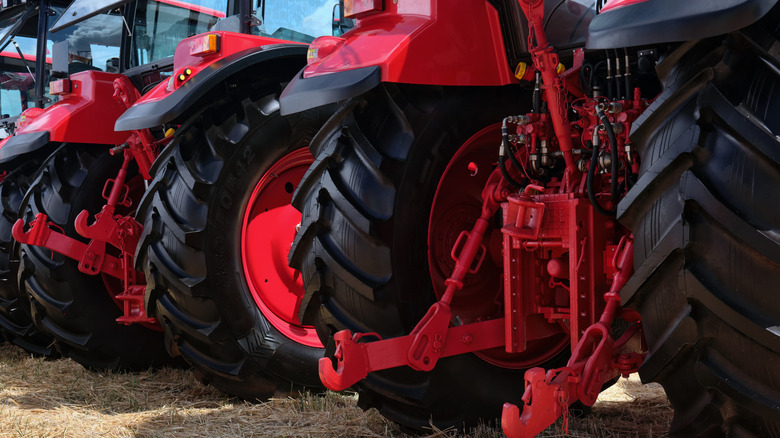Why Are Some Tractor Tires Filled With Water And Beet Juice?
Tractors typically exude a sense of power and clear purpose, regardless of whether they are just a month old or over four decades old. This power and purpose are usually baked into every facet of their build, from their massive tires (which may not be the world's largest tire, but still impressive) to their surprisingly low-horsepower motors that make them the formidable beasts we know and love today. While many vehicle enthusiasts understand how a typical vehicle works, how to diagnose and fix it when something goes wrong, or which vehicle parts to upgrade for a bit more horsepower, only a handful are well-versed in tractors enough to answer some of the most bizarre questions that usually accompany these machines. Among these questions is why some tractor tires are filled with water or beet juice.
The answer lies squarely in traction and stability. Tractor owners might fill their tractor tires with water or beet juice to lower the vehicle's center of gravity and press the tractor toward the ground. This usually translates to improved grip and stability, especially during demanding activities.
Let's talk about liquid ballast
Tractors are usually built very differently from a standard car. While cars typically place more emphasis on speed and how well they can accelerate, which is generally seen in their comparatively high horsepower, tractors focus more on sustained force, which allows them to be more effective in their niche. A few factors usually help a tractor achieve this sustained force. One, of course, is liquid ballast, which increases the tractor's grip, allowing it to exert more power while decreasing the chances of slippage.
In the world of tractor tires, liquid ballast can be defined as a liquid solution that is introduced to the tires to increase the vehicle's overall weight. Many tractor enthusiasts equate it to improved performance where stability, overall traction and grip, and counterbalancing the weight of heavy loads are concerned. Liquid ballast can also enhance your vehicle's safety because it allows you to navigate more challenging terrain, such as slopes, in a safer manner. Today, you can use several types of liquid ballast, including water and beet juice. Let's quickly go over each to see how they may fit your tractor tire grip needs.
Each liquid ballast option comes with pros and cons
Water and beet juice are among the most common liquid ballasts you'll encounter today. Water is readily available for most people, offering a more cost-effective option that is also safe to use. However, water freezes at 32 degrees Fahrenheit, which has caused many tractor owners in regions where the weather gets cold to shy away from it. Water is also not as heavy as other options. It only weighs eight pounds per gallon, while alternatives, like beet juice, come in at 11 pounds. On the other hand, beet juice has gained popularity due to its weight, freezing point of -32 degrees Fahrenheit, and because it is non-corrosive or toxic. However, beet juice is relatively expensive compared to other liquid ballast options.
The remaining alternatives include antifreeze, which comes in at 9.4 pounds per gallon and freezes at -34 degrees Fahrenheit. Antifreeze is usually mixed with water at a 1:1 ratio, resulting in a 50/50 mix. Some users have reported better performance when a higher concentration of antifreeze is used, especially in colder weather. However, just like beet juice, antifreeze is also expensive. Some variants, like ethylene glycol antifreeze, can also be dangerous due to their toxicity.
Aside from antifreeze, you can use calcium chloride, which is non-toxic, weighs 11.3 pounds per gallon, freezes at -58 degrees Fahrenheit, and is readily available for most people. However, calcium chloride is very corrosive to the steel components of tires. Lastly, we have windshield washer fluid, which weighs a comparatively light 7.6 pounds per gallon and freezes at -25 degrees Fahrenheit. While it is lighter than water, its freezing point makes it a better alternative for those living in cold areas. However, the methanol found in most windshield washer fluid is usually very toxic.


